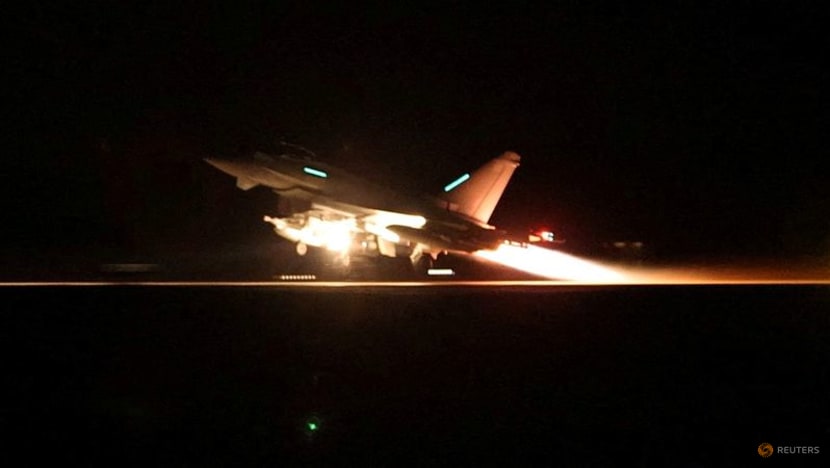Snap Insight: Strikes against Houthis mark significant escalation in Middle East turmoil
The effects of the strikes against Houthi targets in Yemen will likely ripple far and wide, but might not deter further Red Sea attacks, says Carl Skadian, senior associate director at the Middle East Institute, NUS.

An RAF Typhoon aircraft takes off to join the US-led coalition from RAF Akrotiri to conduct air strikes against military targets in Yemen on Jan 12, 2024. (Photo: Sgt Lee Goddard/UK MOD/Handout via Reuters)

This audio is generated by an AI tool.
SINGAPORE: The strikes against the Houthis by a United States-led coalition, while not unexpected, have significantly widened the conflict in the Middle East, despite Washington’s efforts to contain it over the past few months.
The air and sea strikes by the US and some of its allies on Thursday (Jan 11) against about a dozen Houthi military targets in Yemen had been widely telegraphed: A “last warning” was issued last week, but the Iran-backed Houthis vowed not to back down.
On Jan 9, the militants made good on their word, launching what was described by US Central Command as a “complex attack” using drones and anti-ship cruise and ballistic missiles, all of which were shot down by coalition forces. That attack was widely viewed as the straw that would break the camel’s back - an assessment proved correct by Thursday’s strikes.
The anti-Houthi operation now risks dragging the US deeper into the Middle Eastern quagmire. Although the strikes aimed to thread the needle - by attempting to cripple the Houthis’ ability to continue attacks against shipping, rather than more escalatory moves such as targeting the group’s leaders or its Iranian advisers - whether they will prove to be a deterrent is far from clear.
ANTI-HOUTHI OPERATION TO HAVE WIDE RIPPLE EFFECTS
Indeed, the Houthis appear to relish an open confrontation with the US. In the wake of last week’s warnings, the group’s leader, Abdul-Malik al-Houthi, was reported as saying in the New York Times that the “Yemeni people … are comfortable with a direct confrontation with the Americans”.
The group has now vowed to respond, warning that the US and the United Kingdom will pay a “heavy price” for their “blatant aggression”.
There are relatively low costs for the Houthis to continue even limited attacks against shipping: Even a single attack on a ship would allow it to claim a psychologically significant win over US might. Meanwhile, Iran, though reluctant to get directly involved in a confrontation with the West, will likely ratchet up actions by its proxies.
The effects of Thursday’s events will likely ripple far and wide. Already, oil prices have surged by more than 2 per cent.
With the prospect of increased violence in the Red Sea, more shippers are expected to avoid sending vessels through the area and will instead opt for the longer route around the Cape of Good Hope, leading to lengthier shipping times and increased costs. Thursday’s seizure of an oil tanker off the Omani coast by the Iranian Navy will add to the fears.
THE NARRATIVE MATTERS
Just as important is the battle over the narrative in the wake of Israel’s campaign in Gaza. While the US and its allies have painted their actions in the Red Sea as an effort to protect global commerce, the Houthis have linked theirs directly to the war, openly stating they want to force Israel to halt its offensive and allow humanitarian aid into Gaza.
As Tel Aviv pursues its campaign unabated, global opinion is increasingly arrayed against it and the US. That risks painting the Red Sea operation less as a campaign to protect freedom of navigation than one that directly supports Israel’s prosecution of the war in Gaza.
As of now, the former retains traction: The United Nations Security Council voted 11-0 in favour of a resolution condemning Houthi attacks against shipping earlier this week.
The challenge for the coalition is to keep its narrative valid. Its strongest argument for this is the continuing havoc being wreaked on the global economy by Houthi actions, which has consequences for us all.
Carl Skadian, a former journalist and editor for 30 years, is Senior Associate Director at the Middle East Institute, NUS.















